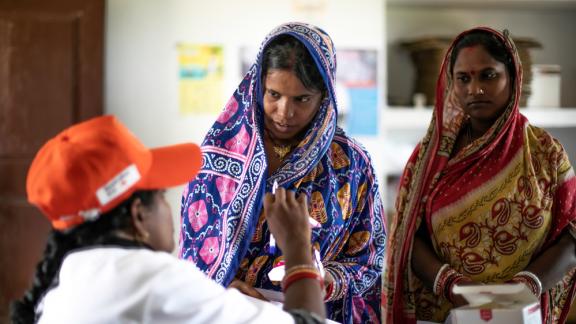24-year-old Muzhgan Qurashi has lived all her life in the Balkh province of Afghanistan, which is 20 kms northwest of the provincial capital of Mazar-e-Sharif. She has a family of eight people-- her mother, two sisters, one brother, his wife and their three children—and she is the principal bread earner. Since childhood, she has witnessed gender discrimination and disregard for women’s rights. She saw several of her aunts and cousins struggle with complicated pregnancies and die of complications. She grew up seeing women unable to speak about issues that affected them, including their health. They rarely talked about their problems and when they did get down to seeking medical attention, their condition had significantly worsened.
“As a child I saw women die during childbirth. It pained me to see them suffer. Worse still was the brood of children most deceased women left behind, including adolescent girls, who too were unaware of their sexual and reproductive health and rights.” Muzhgan Quraishi, Supervisor for Balkh Province under the Japanese Supplementary Budget supported AFGA project.
According to the United Nations data, Afghanistan has one of the highest maternal mortality rates in the world where an estimated 638 women die per 100,000 live births. Poverty, lack of access to health services and gender inequality contribute to these tragically high numbers. Fewer than 60% births are overseen by skilled health professionals.
When Muzhgan got into a conversation with a gynaecologist in the local provincial hospital she learnt that many of the women’s lives could have been saved had they received timely medical attention. This prompted her to do a course in midwifery after her graduation with the sole purpose of creating greater awareness around women’s sexual and reproductive health (SRHR). She convinced her family, telling them she wanted to help women and she felt strongly about the fact that while they could discuss and seek help for their other health needs like dental problem, eye issues, cardiac ailments, physical aches and pains, SRHR did not fall in the same category. There was shame, embarrassment, humiliation and an overall inability to prioritize this aspect of their lives. She wanted to ensure this silent suffering of women was alleviated and they learnt to seek timely help through reliable and trusted sources, which in the Afghan setting is usually through a member of the same gender.
After completing a course in midwifery, Muzhgan was working in the community and was associated with several health care facilities. She was making house visits to assist women in their deliveries and doing pre and post natal check-ups when she heard about the JSB-AFGA project. She found this to be a perfect opportunity to learn new things and was excited about applying digital health interventions, which was the USP of the project, to improve outreach services for adolescent girls and women. Her family was initially reluctant to allow her to travel to Kabul for the training, organized by the Afghan Family Guidance Association (AFGA), but her enthusiasm and commitment convinced them. During the training, she met nine other supervisors who were part of the project.
The insights and conversations built a camaraderie and they shared issues that they were facing and also solutions which they could all adapt to suit their context. The supervisors resolved to stay in touch and started a WhatsApp group so they could share with one another what they were doing and seek advice on special cases. Each Supervisor was assigned a group of midwives in their province who they were regularly in touch with for any handholding support they may need as they went about providing door-to-door SRHR services. Muzhgan feels that the timing of her training and induction into the project was for a reason. She could provide valuable support to women at one of the most critical moments of Afghanistan’s history. Women now needed guidance more than ever before. Their contact with the external world had become limited. Health facilities were not working optimally.
However, the new regime had allowed outreach health workers and midwives to move around and provide services to households. The role of midwives and Supervisors like her therefore had become extremely relevant. Women had all kinds of questions and no one reliable to turn to. From seeking birth control pills and condoms to confiding about sexually transmitted infections and questions around breastfeeding, menstrual hygiene and other gynaecological issues, they had so many concerns, fears and dilemmas.
The JSB-AFGA project prepared the 10 Supervisors including Muzhgan not only to reach women in conflict prone provinces with lifesaving services but also showed them how in a grave humanitarian crisis, they could still be relevant and of use to the people they were mandated to serve. Between their in-person visits and mobile phones/tablets they were always in touch with the women and families under their care. She places on record how the last few months have changed her in many ways. She says, “We learnt to use technology not just to communicate but save lives. Benefits of interacting with gynaecologists/ obstetricians whose expertise was available to us for complicated cases and meeting other women supervisors and midwives from across the country was immense. We always knew women had a strong bond amongst themselves. Through the midwifery training and the JSB project I feel so much more confident of helping hundreds of women who are in desperate need of services.”
In a first-of-its-kind initiative, 150 midwives have been trained through a simulation based digital platform to reach over 45,000 households in 10 conflict prone provinces during 2021–2022. This has been a noteworthy initiative for many reasons. Afghanistan has a high rate of maternal mortality. Women get married young and have little access to sexual and reproductive services, leading to frequent and numerous pregnancies, high risk of complications and a lot of stigma and shame attached to a subject that is still considered taboo. The JSB-AFGA project - A community-led intervention was launched in mid-2021.
when
country
Related Member Association









